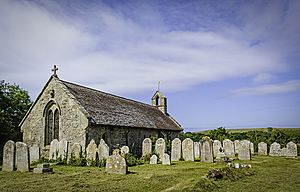St James' Church, Kingston facts for kids
Quick facts for kids St James' Church, Kingston |
|
|---|---|
 |
|
| 50°37′47″N 01°19′28″W / 50.62972°N 1.32444°W | |
| Denomination | Church of England |
| Churchmanship | Broad Church |
| History | |
| Dedication | St James |
| Administration | |
| Parish | Kingston, Isle of Wight |
| Diocese | Portsmouth |
| Province | Canterbury |
St James' Church, Kingston is a historic parish church located in Kingston, Isle of Wight. It is part of the Church of England. Kingston used to be its own church area. Now, it is combined with the nearby Shorwell parish. This new combined area is called Shorwell with Kingston.
Contents
A Look at St James' Church History
How the Church Was Built
St James' Church has a long and interesting history. The church was rebuilt in 1892. An architect named R.J. Jones was in charge of this work. The building stands on a small hill. From there, it looks down towards the old manor house.
What Makes It Special
The church still looks much like it did when it was first built. This was in the later part of the 1200s. It has a simple rectangular shape. There is no arch separating the main part of the church from the altar area.
Some of the original features from the 1200s are still there. These include the double hollow lancet windows. You can see these windows in the north and south walls. The lower part of the east window is also original. There is also a special trefoiled credence in the south wall. A credence is a small niche or shelf. It is used for holding things needed for church services.
Changes Over the Years
In the 1400s, new windows were added to the church. A south door was also put in during this time. You can still see the corbels from this period. Corbels are stone supports that stick out from a wall. They are above the east and west windows.
Later, in 1766, a porch was built at the south door. In 1872, a vestry was added. A vestry is a room in a church used for changing robes or storing things. Also, the 15th-century windows were replaced with lancet windows at that time.
Important Memorials
The church also has a good 16th-century brass memorial. This brass is for Richard Meux, who died in 1535. It shows his family's coat of arms.

